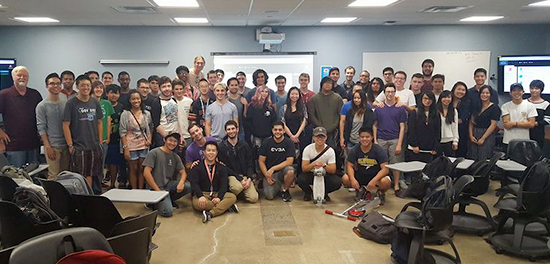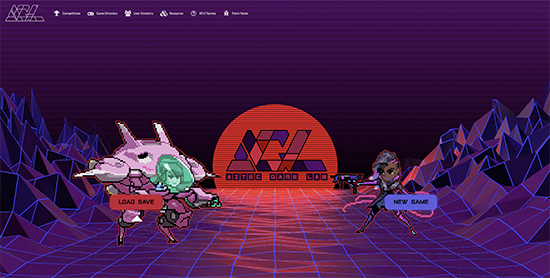@State May 2018- Aztec Game Lab
The Aztec Game Lab

By Erik Good
As an avid gamer and a third-year computer science major, Nathan Danque noticed last year that something was missing from his collegiate experience.
"There are a lot of gamers here, there's a lot of potential for people to make games, but there was no community for those kinds of people," Danque said.
Recognizing that there was no existing program at San Diego State University to put students on a path to the gaming industry, Danque and his peers set out to establish the Aztec Game Lab, an interdisciplinary student group that uses their backgrounds in computer science, graphic design, music and more to learn and apply real-world skills to the field of game creation. With San Diego's role as host to several noteworthy game developers, including Rockstar San Diego, Sony Interactive Enertainment's San Diego Studios and Psyonix, it's no surprise that interest in establishing the Aztec Game Lab was swift.

"It took three to four months of planning beforehand. Now we have about 160 members and industry connections and sponsorships with big names like Playstation and HTC," Danque, the current president, said.
While the Game Lab has been able to tap some of the resources within the Computer Science department to promote the club, its growth in areas of expertise outside of coding has allowed it to become more robust. By pairing developers with graphic designers, vocal artists, musicians and other disciplines, the Game Lab has been able to deliver multimedia experiences in exchange for prizes as a part of their bi-yearly game jams.
Game Jams
Similar to a hack-a-thon, a game jam is an event in which students have a designated length of time to build a game; one game jam runs the length of the academic year, while the other is a 48-hour free-for-all. Once completed, games are uploaded to the Aztec Game Lab's website, where members vote for their favorite.
"A lot of great stuff comes out of game jams at a professional level. To get to do that while at school is a great way to build your own personal portfolio because that's what private industry is looking for," said Dwayne Wilkes, a computer science junior who also serves as vice president of the Artificial Intelligence Club.
"It's a really fun way to come together, very 'trial by fire.' You work together on something and if it's not working, there's going to be someone else there who's going to help you out. Even when it's competitive, there's still so much camaraderie between people, even on different teams, because it's about the enjoyment of the space," Wilkes said. "It's almost a free-form tutor lounge."
The experience of working with the Aztec Game Lab has allowed Wilkes to explore using emerging technologies firsthand. Between his involvement in the Game Lab, the Virtual Reality Club, and "The Future," an upper-division general elective humanities course, Wilkes has been able to work with cutting-edge technologies, including a modified backpack that allows wearers to roam their playspace in virtual reality without the worry of being tethered to their PC.
Preparing Members for Industry Careers
Even the Aztec Game Lab's website has been carefully crafted to assist in its members' success. With an entire section dedicated to free resources for student projects and the website itself doubling as a portfolio of work that members can upload games to, the entire experience for members is one that tracks towards real-world skills applicable in their careers.
Danque and Wilkes both agree that the Aztec Game Lab's strength is in the diverse skill sets of its members. "I'd really like to see more artists get involved, especially since in the industry it's a good way to build experience. By coming to our club, if anyone needs something, you can go ahead and get it out there and add it to your portfolio," Danque said.
"We're an organization that really wants to expose you to as much as possible that your professors might not necessarily show you," said Danque. "We want to get you connected with the industry, and we want to inform you of what's actually going on (with current industry standards). So when you're ready to enter the job field, you're more prepared than anyone else."
The Aztec Game Lab meets on Fridays, 1-3 p.m. in the VITal Lab in AH-1120. Visit www.aztecgamelab.com or contact @aztecgamelab on Instagram for more information.
